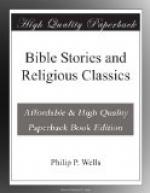“Nay, feeble brother, be not as one who hath never known the light,” said the elder Quaker, earnestly, but with mildness. “Art thou he that wouldst be content to give all, and endure all, for conscience’ sake; desiring even peculiar trials, that thy faith might be purified, and thy heart weaned from worldly desires? And wilt thou sink beneath an affliction which happens alike to them that have their portion here below, and to them that lay up treasure in heaven? Faint not, for thy burden is yet light.”
“It is heavy! It is heavier than I can bear!” exclaimed Pearson, with the impatience of a variable spirit. “From my youth upward I have been a man marked out for wrath; and year by year, yea, day after day, I have endured sorrows, such as others know not in their lifetime. And now I speak not of the love that has been turned to hatred, the honor to ignominy, the ease and plentifulness of all things to danger, want, and nakedness. All this I could have borne, and counted myself blessed. But when my heart was desolate with many losses, I fixed it upon the child of a stranger, and he became dearer to me than all my buried ones; and now he too must die, as if my love were poison. Verily, I am an accursed man, and I will lay me down in the dust, and lift up my head no more.”
“Thou sinnest, brother, but it is not for me to rebuke thee; for I also have had my hours of darkness, wherein I have murmured against the cross,” said the old Quaker. He continued, perhaps in the hope of distracting his companion’s thoughts from his own sorrows. “Even of late was the light obscured within me, when the men of blood had banished me on pain of death, and the constables led me onward from village to village, toward the wilderness. A strong and cruel hand was wielding the knotted cords; they sunk deep into the flesh, and thou mightst have tracked every reel and totter of my footsteps by the blood that followed. As we went on—”
“Have I not borne all this; and have I murmured?” interrupted Pearson, impatiently.
“Nay, friend, but hear me,” continued the other. “As we journeyed on, night darkened on our path, so that no man could see the rage of the persecutors, or the constancy of my endurance, though Heaven forbid that I should glory therein. The lights began to glimmer in the cottage windows, and I could discern the inmates as they gathered in comfort and security, every man with his wife and children by their own evening hearth. At length we came to a tract of fertile land; in the dim light, the forest was not visible around it; and behold! there was a straw-thatched dwelling, which bore the very aspect of my home, far over the wild ocean, far in our own England. Then came bitter thoughts upon me; yea, remembrances that were like death to my soul. The happiness of my early days was painted to me; the disquiet of my manhood, the altered faith of my declining years. I remembered how I had been moved to go forth a wanderer, when my daughter, the youngest, the dearest of my flock, lay on her dying bed, and—”




